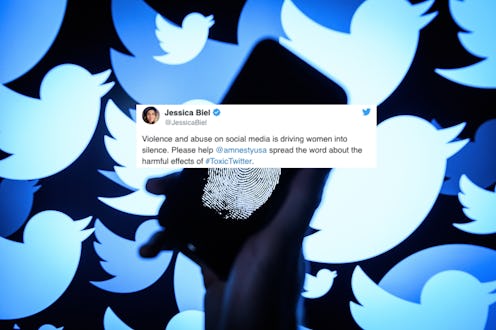
Many people have long called for Twitter to more stringently enforce its anti-harassment policies; actor Leslie Jones took a break from the platform in 2016 after being targeted by racist trolls, and actor Rose McGowan was briefly suspended from the site last year after tweeting about alleged sexual harasser and abuser Harvey Weinstein, which she blamed on "powerful forces at work." But a new report from human rights organization Amnesty International is accusing Twitter of being "a toxic place for women," and it focuses specifically on women in marginalized groups. "The research highlights the particular experiences of violence and abuse on Twitter against women of colour, [sic] women from ethnic or religious minorities, lesbian, bisexual or transgender women, non-binary [sic] individuals, and women with disabilities, to demonstrate the intersectional nature of abuse on the platform," the research says. The report also says that nonbinary people on Twitter face targeted abuse "for not conforming to gender norms of male and female."
Vijaya Gadde, Twitter's head of legal, policy and trust and safety, responded to the Amnesty International report in a statement provided to Bustle. "The assertion that Twitter is consciously unengaged with human rights issues is an unfair representation not just of the facts, but of the ethos of our dedicated teams, and the core mission of the company," the statement reads. "We agree with many of the recommendations contained in the Amnesty International report. A number of the proposals represent work already completed or underway at Twitter. Abuse and hateful conduct directed at women are prohibited on our platform."
According to Amnesty's report, which interviewed 86 women and dozens of experts, nearly one in four women say they have experienced online harassment, and 60 percent of women say their harassment came from strangers. Even though Twitter has met with Amnesty International about its concerns, the social media platform did not provide information about how it moderates offensive content, the report alleges.
Diane Abbott, the first Black Member of Parliament in the UK, is quoted in the report about the abuse she's faced. “I welcome scrutiny, and I welcome engagement, and I welcome debate. That’s why I was so positive about these online platforms. But the problem is when people are not engaging in debate or scrutiny but just showering you with abuse," she said. "It’s just abuse which has no political content and which actually people wouldn’t say in a meeting or to your face."
According to Amnesty, it's even more difficult for women who belong to marginalized groups — a woman who is openly gay will face even more targets from trolls than a straight woman, for example. "Women who face discrimination because of their different identities offline often find that violence and abuse against them will target those same identities on Twitter," the Amnesty report says. "This is because an individual’s race, religion or sexual orientation, for example, can have just as much of an effect as gender — if not more — on how that person is treated both in the physical and digital world."
So what can be done? Amnesty claims Twitter is "inadequately" and "inconsistently" enforcing its policies against harassment, and women don't trust that they'll actually be taken seriously after reporting hateful content. "Twitter’s inadequate response to violence and abuse against women is leading women to self-censor what they post, limit or change their interactions online, or is driving women off the platform altogether," the research says. The organization is asking Twitter to share data about violence against women, change its reporting protocol and making users aware of security features that can make it harder for trolls.
Gadde says Twitter is already making many of the changes recommended by the organization. In a statement to Bustle, he says:
We have made more than 30 individual changes to our product, policies and operations in the past 16 months. We have increased our action rates ten-fold. We have made significant changes to our reporting tools and continue to improve them as well working to communicate more clearly with our users on reports and how we draft policy. We continue to expand our Transparency Report to include relevant and meaningful data. We have seen extraordinary engagement supporting women. The rise of movements like #MeToo, #WomensMarch, and #PositionOfStrength are testimonies to the power of Twitter as a platform for women and their allies to share stories, offer support, and advocate for change. We are committed to understanding how we can better combat the hatred and prejudice within society that gives rise to online abuse and how we can encourage a healthier public conversation. We are an open platform and hold a mirror up to human behaviors — both the good and the bad. Everyone has a part to play in building a more compassionate and empathetic society, including Twitter. Our policy, product, and engineering teams continue to work collaboratively to find ways to innovate to protect our users and enhance their experience, particularly as those in our society intent on harm find new ways to hurt and abuse. We look forward to ongoing constructive engagement with Amnesty International and others to find real, lasting solutions to ensure women are safer and feel safer online.
Movements like #MeToo do show that Twitter can be used for social good, but many women are well aware of the harassment that can come with publicly existing as a woman online. The push for Twitter to do more to combat harassment will likely resonate with women everywhere who have ever experienced it — and unfortunately, it's easy for many of us to relate.